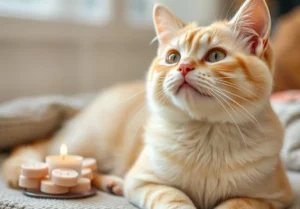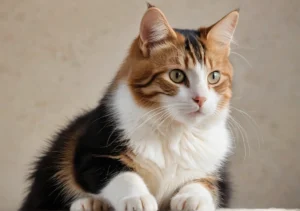
We’ve all experienced the sting of a feline cold shoulder, wondering why Mr. Whiskers snubs your affection but curls up happily in the lap of your friend. Let’s solve this mystery together so you can become a feline favorite, too.
Quick Takeaways:
- Mimic cat-friendly body language by slow blinking and respecting their space to build trust.
- Use mildly scented personal care products to not overpower their sensitive sense of smell.
- Engage in calm, playful activities that mimic their natural behaviors to create positive associations.
Why Do Cats Choose Their Favorite People?
Ever wonder why cats seem to gravitate towards some folks more than others? Well, it turns out it’s not just a whim. Cats are incredibly perceptive creatures, and they pick up on a variety of signals that help them decide whom they’re going to cozy up to.
First off, scent plays a significant role. Cats have a highly developed sense of smell, and they use it to gather information about the world around them, including people. If your scent is similar to something positive in their memory or you just naturally smell good to them, you’re already off to a good start.
Another factor is the sound of your voice. Cats are more likely to be drawn to people with a soft, calm voice because it makes them feel safe and secure. High-pitched, soothing tones often mimic the comforting sounds they heard as kittens.
Lastly, your mannerisms matter. Cats favor people who respect their space and understand their body language. Quick movements or trying to force affection when they’re not in the mood can be off-putting. So, paying attention to how they like to interact and giving them control over when and how they engage can make all the difference.
How Do Your Behaviors Influence a Cat’s Preference?
Now, let’s get into the nitty-gritty of how you can be more appealing to Mr. Whiskers. It’s all about respecting their cues and sharing positive experiences.
-
Give them space : Cats value their personal space and often won’t appreciate unsolicited attention. Let the cat come to you, and you’ll find they’re more likely to warm up to you on their terms.
-
Playtime : Engaging in play that mimics their natural hunting behaviors (think wands with feathers or little bouncing balls) can help build a strong and positive association with you.
-
Slow Blink : Cats perceive slow blinking as a sign of trust and affection. Try it out! Slowly close your eyes, hold for a couple of seconds, and then slowly open them while thinking loving thoughts about your furry friend. It sounds a bit quirky, but in the feline world, it’s akin to saying, “I love you.”
Can You Change a Cat’s Mind About You?
If Fluffy isn’t giving you the time of day, don’t lose hope. Changing a cat’s mind about you might take time and patience, but it’s certainly possible with consistent effort and understanding.
-
Positive Associations : This is where you pair your presence with something the cat loves. Find out their favorite treat or toy and offer it when you’re around, making sure not to force interaction. Over time, they’ll start associating you with good things.
-
Routine : Cats are creatures of habit. Being involved in their daily routine—feeding, playing, or even cleaning their litter box—can help you become a familiar and comforting presence.
-
Patience and Consistency : Sometimes, all it takes is time. Don’t rush the process. Continue to be gentle, offer space when needed, and gradually, you’ll notice acceptance, and eventually, affection.
Here’s a pro tip : Cats are often more receptive to interaction after they’ve burned off some energy. Try engaging in a playful session right before mealtime—then, while they’re eating, sit close by. This routine can cement your status as a non-threatening, positive part of their day.
Remember, building trust with a cat is a journey, not a destination. Each small step brings you closer to being accepted into their world. Keep at it, and before you know it, you might just become their new favorite human.
So there you have it, folks! Understanding why cats like some people and not others doesn’t have to remain a mystery. By paying attention to how you interact with them and respecting their individual needs and preferences, you can build a loving and mutually respectful relationship with your feline friend. Stay tuned for more insights into the captivating world of cats in the next sections of our blog.
What Role Does a Person’s Scent Play?
Have you ever noticed how a cat seems magnetically drawn to some people, while giving others the cold shoulder? It might have more to do with your scent than you think. Cats have an incredibly keen sense of smell, and certain scents can either attract or repel them.
The Science of Scent
A person’s natural scent plays a significant role in a cat’s reaction. Our bodies release hormones and pheromones that cats can detect, influencing how they feel about us. For instance, if you’re calm and happy, your body releases pheromones that cats find comforting.
Hygiene Matters
While cats are attracted to natural human scents, an excess of artificial fragrances from perfumes, lotions, or even strong-smelling detergents can be off-putting. Cats have a preference for cleanliness, but ironically, the overpowering smell of artificial scents can be a turn-off.
A Tip Most Miss
Here’s a little nugget of wisdom that’s often overlooked: the scent of your pet’s previous experiences with humans can also influence their perception. If you’ve spent time with other animals, especially cats, their scents on your clothing can make you more intriguing or, conversely, more intimidating, depending on their past interactions.
Practical Takeaway
- Use unscented or mildly scented personal care products.
- Spend time around other friendly cats, if possible, to ‘collect’ positive scents.
- Remember, patience is key. Each cat will react differently as they’re unique in their preferences and experiences.
How Important Is Body Language?
Understanding and respecting a cat’s body language can vastly improve your relationship with them. It’s not just about what we do, but how we do it.
The Dos
- Slow Blinking: This is the cat equivalent of a smile. Try looking at your cat and slowly closing your eyes and opening them. If they return the gesture, congratulations, you’ve just been smiled at by a cat!
- Respect Their Space: Let a cat come to you. Forcing interaction can be seen as threatening.
- Sideways Approach: If you do need to approach a cat, do so from the side rather than head-on, and crouch down to their level. This is less intimidating.
The Don’ts
- Direct Staring: In the feline world, staring is considered aggressive. Avoid prolonged eye contact.
- Tower Over Them: Standing over a cat can be incredibly intimidating. Always try to get down to their level.
- Fast Movements: Quick movements can startle a cat. Keep your actions deliberate and slow.
Body language isn’t just about how you physically interact with a cat, but also how you carry yourself and your emotional state. Cats are incredibly perceptive and can pick up on anxiety, impatience, or even overexcitement, which can affect their behavior towards you.
A Unique Insight
Many sources talk about using treats and toys in interactions, which is helpful, but one often overlooked aspect is mirroring your cat’s body language. If your cat is relaxed, showing you their belly, or blinking slowly, mirroring these actions can enhance bonding. Lay down parallel to them and offer a slow blink back. It’s a small gesture that speaks volumes to a cat.
In both scent and body language, the key takeaway is that cats are deeply sensitive creatures, heavily influenced by their sensory and emotional environments. By being mindful of the little things – how we smell, how we move, and how we respond to their cues – we can foster a deeper, more affectionate bond with these enigmatic companions.
Alex, a passionate animal lover, has experience in training and understanding animal behavior. As a proud pet parent to two dogs and three cats, he founded AnimalReport.net to share insights from animal experts and expand his knowledge of the animal kingdom.





This site is fabulous. The radiant material shows the publisher’s enthusiasm. I’m dumbfounded and envision more such astonishing material.
Fantastic site. Lots of helpful information here. I am sending it to some friends ans additionally sharing in delicious. And of course, thanks for your effort!